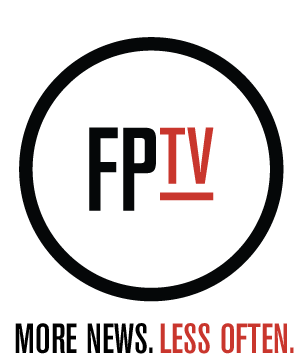No Point In Looking Back: An Interview with Phantogram
Phantogram. Photo: Timothy Saccenti
New York electro-pop duo Phantogram are fresh off with their festival circuit of shows with Outkast’s Big Boi, including a stop back at FPSF. The group, which consists of Sarah Barthel on keyboard and vocals and Josh Carter on vocals and guitar, have found critical acclaim through their three records, with Three being their latest. The duo spoke to Free Press Houston at last weekend’s Sound On Sound Fest to discuss their collaboration with Big Boi, the touring process, and the significance of reviewing records.
Free Press Houston: This is one of your more recent shows without Big Boi, but how did the Big Grams collaboration come about?
Josh Carter: Long story short, we met Big Boi five or six years ago. We were on tour and we went down to Stankonia when were were in Atlanta, he invited us over there. We ended up working on three songs with him on his last solo album. It just went really well, the vibe and the energy was there. We were like “fuck it, let’s make some more music.” We were done with Voices and he was done with his stuff. We ended up going right back to the studio and did some shit with him.
FPH: Could it work with another rapper, even one like Riff Raff?
Both: No, not Riff Raff. [laughs]
Sarah Barthel: I think, in general, Josh and I have the same kind of creative concepts, the way it goes with Outkast, so we knew that it would be a good fit.
FPH: My first time seeing you was when you opened for Muse in Houston at the Toyota Center. From those shows, an arena tour, to your recent festival shows, what have been some of the biggest differences?
Josh: Touring with Muse? Well, the big difference was that those [Muse] shows were the first ones that we played where we were in the center of an arena. That was very different. It was a crazy stage setup, so we had to get used to working in a circle, you know?
Sarah: Yeah, it was very different from any tour we’ve ever been on or will probably ever go on. [laughs]
Josh: Yeah, I don’t imagine, even if we get to arena status — or I should say when we get to arena status — I don’t see us setting up in the center of it. We’ll keep it a little more classic.
FPH: Have you heard the news that muse plans to “levitate with a stage of magnets” on their next tour? What do you think about that? Do you think it’s possible?
Sarah: They’re so cool, they do the weirdest shit. I love it. Yeah, I think anything is possible.
Josh: If you can dream it, you can do it.
Sarah: We really admire Muse, because of their visual concepts. They don’t just the music serious, they take the whole experience of the serious. They’re capable of doing anything.
FPH: You guys are approaching being a band for 10 years. Besides the change of venues, what’s different now?
Josh: There’s really no point in looking back, because you can’t change anything anyways. There’s nothing I’d want to change. I mean we’re looking forwards to the future, you know? The only one thing I could say, just as an artist, is that I miss having a little more alone time. We travel so much, so there’s not as much time for that.
FPH: Josh, you are sponsored by Ernie Ball Guitars, along with other musicians at Sound On Sound including Turnstile and Descendents; is that kind of stuff a community at all, being that they are fairly uncommon guitars?
Josh: I thought it was really cool that Anne from St. Vincent does the Ernie Ball thing. You know, those were the only strings I knew growing up. They wanted to collaborate on a special model with us, so that was my biggest decision, playing with Ernie Ball, but I also play with Fender a few others. I’m not strictly tied down, but they’ve been a great company to me.
FPH: What about your record label? Is the Republic community pretty tight, being that those other artists on the label are ones that sell out arenas?
Josh: No, I don’t think so, as far as artists. I don’t even really know who’s on our label. I know that Lil Wayne and The Weeknd is. I mean, so is Ariana Grande. I don’t really care. We’re Phantogram. I think what they do at Republic is they have their lanes for different artists, so we have our own lane that we’re going down. It’s our vision to never change. We decided to sign to a major label, but we stayed true to ourselves.
FPH: Your latest album, Three, was produced by Ricky Reed. For those that aren’t familiar, he’s worked with the liking of Pitbull and Five Seconds of Summer. Was it a conscious decision to work with a big name producer?
Josh: I didn’t know who Ricky Reid was until we met him.
Sarah: No clue.
Josh: When we were meeting up with the co-producers for the record, we just — I just liked his work ethic and style. He was very 9 to 5, in a way, and we’re not that kind of people, so it was, like, no bullshitting around. We just got to work everyday and did it, not getting distracted by watching cat videos on YouTube for an hour. It was very professional, he’s a great guy. I would definitely work with him again if we get the chance.
FPH: Is there a producer that you’d like to work with in the future that you haven’t already?
Sarah: I’ve always wanted to work with Beck, and I could speak for the both of us. We’ve been fans of him from the beginning. I love the way he reinvents himself each record. I love everything he’s done, especially with Charlotte Gainsbourg. He’s on our list.
Josh: I’d like to work with Dave Fridmann. I’ve been saying that for a long time. A lot of my favorite artists have done stuff with him like Black Moth Super Rainbow, Sparklehouse, the Flaming Lips — I wonder if Beck has done something with him? Anyway, Dave Fridmann would be pretty high on my list. I would say him and Trent Reznor, depending on the vibe we’re going for on our album.
FPH: Speaking about different vibes on different albums, and being a headlining band, do you feel like the band still has the freedom of changing up the sound or do the fans hold you to a certain standard, in terms of how the record should sound? I mean, could a band still release completely different records like, say, Ween?
Sarah: I think that if you don’t change up your sound, you limit yourself as an artist, and there’s no reason to make it a cookie cutter concept where you know what you need to do so someone will like you. I think, as true artists, and if you’re a fan of an artist, you should — you might not like everything — but you should respect them for that, you know? And you can just hope that you like more of their stuff next time. I think that’s natural and that should be the norm, instead of the cookie cutter stuff that’s on the radio. There’s no growth, there’s no falling in love with a band, in that kind of way.
FPH: Before this I checked out a few minutes of the live Needledrop podcast, and the focal point was on the future of music journalism. The band being interviewed, clipping., brought up the fact that when people read reviews from pages like Pitchfork and Stereogum, it’s hard to relate, compared to individual people like the Needledrop himself. What makes for a fair, influential review, and is it true that larger outlets can pull it off?
Josh: I think an influential review can be written, but how can you quantify it by putting a fucking 0 to 10 with a decimal system, you know? That makes no sense whatsoever, and I’m not naming any specific publication. It’s hard to quantify things from 0 to 10 or 0 to 5 stars. Just write what you’ve observed or heard, and listen to record more than once. I feel like when I’ve read some reviews for bands, it almost seems that the the reviewer had their boss slam the fucking demo on their table and was like “here, review this,” and they’re like “okay, I just got out of school for English, and I like the sound of my own voice.” So, whatever. I would like to read about the bands. Then, I could decide if that’s something I’d like to check out. It’s not about how many stars their album got. That’s not art-friendly.
Sarah: It’s more negative based. You watch TMZ for people falling. Lindsay Lohan gets attention for being so negative and doing things, and people like to look at that stuff. They like to read more negative than positive.
Josh: I don’t even think it’s a matter of positive or negative, it’s just like seeing a rating is already a tainted perception. I don’t care about what you rate an album, just write what you think about it. I mean, the Quietus does that. They just write about the album. It’s a British publication. I’d rather read something like that.











![FPH_2016_AdPackage_Lovebuzz_420x75-FeaturedBanner[Mobile]](../2016/08/wpimages_subdomain/FPH_2016_AdPackage_Lovebuzz_420x75-FeaturedBannerMobile.png)

